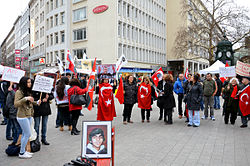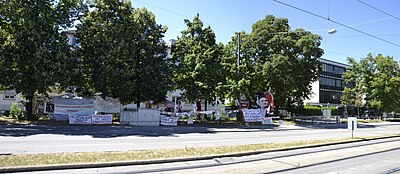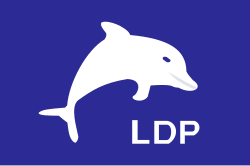Turkey internet ban protest 2011
Thousands of Turks gathered in some 40 cities and towns around the country on Sunday, May 15th, to join marches organized on Facebook against state Internet censorship.
The trigger for the protests was a decision by Turkey’s Internet regulator, the Information and Communication Technologies Authority, or BTK, to introduce a selection of filters that Turkish Internet users would choose from before browsing the Internet, beginning in August.
Under a decision on “Rules and Procedures of the Safety of Internet Use” approved by the BTK in February, Internet users in Turkey will have to choose one of four Internet packages: family, children, domestic or standard. The list of websites filtered by each package will be decided by the BTK but will not be made public.
The change will be implemented starting August 22.
According to BTK Chairman Tayfun Acarer, Internet users will maintain their current access to Internet websites if they chose the standard package. “How is it possible that [the BTK’s decision] is being manipulated in this way?” he asked, saying a similar application was also available in European countries.
“If we were to require everyone to take the children’s package, I would agree with the criticism” Acarer said. He added that people would be subscribed to packages other than the standard one only upon their own demand.
In December 2010 the OpenNet Initiative, a non-partisan organization based in Canada and the United States, classified Internet censorship in Turkey as selective (third lowest of four classifications) in the political, social, and Internet tools areas. Reporters Without Borders, an international censorship watchdog organization, included Turkey on its 2011 list of 16 countries “under surveillance” (the less serious of two Internet censorship lists that it maintains), saying:
‘The year 2010 was marked by the widely covered deblocking of the video-sharing website YouTube which, unfortunately, did not equate to a lifting of online censorship in Turkey. In a country where taboo topics abound, several thousand websites are still inaccessible and legal proceedings against online journalists persist.’
Haberturk newspaper said 50,000 joined a protest centered on the city’s Taksim Square, while CNN-Turk reported “hundreds of thousands” taking to the streets in demonstrations across the country. More than 600,000 people joined a Facebook page named “Internetime Dokunma!” or “Don’t Touch My Internet!” The group’s organizers say Turkish authorities have already blocked 60,000 websites.Relevante Bilder










































Relevante Artikel
Proteste in der Türkei 2013Als Proteste in der Türkei 2013, auch Gezi-Proteste, werden Demonstrationen und Aktionen von Bürgern in der Türkei gegen die Regierung von Ministerpräsident Recep Tayyip Erdoğan zusammengefasst. Die Protestwelle begann am 28. Mai 2013 in Istanbul mit Demonstrationen gegen ein geplantes Bauprojekt auf dem Gelände des Gezi-Parks, der unmittelbar an den Taksim-Platz angrenzt. Nach der Eskalation des Konfliktes infolge eines gewaltsamen Polizeieinsatzes am 31. Mai 2013 opponierten Demonstranten in mehreren türkischen Großstädten gegen die als autoritär empfundene Politik der islamisch-konservativen Regierungspartei Adalet ve Kalkınma Partisi (AKP). .. weiterlesen
